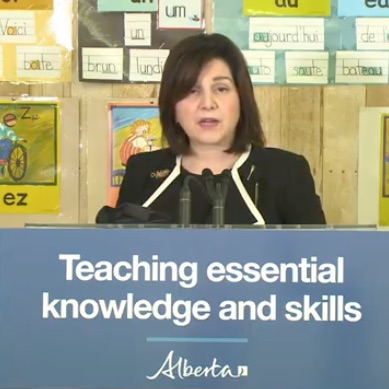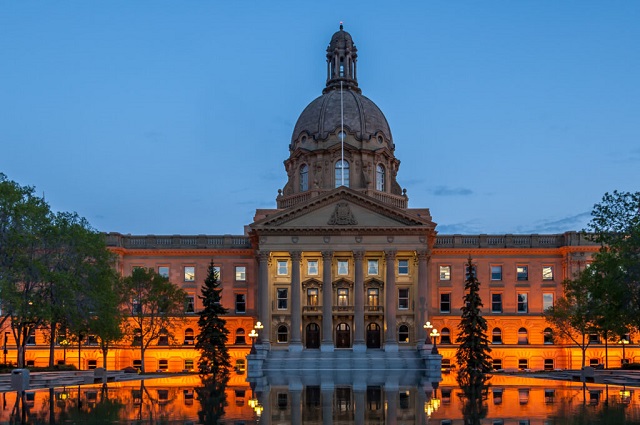Alberta
Literacy, numeracy, citizenship and practical skills featured in new Alberta K-6 curriculum

The following is a news release from the Province of Alberta
New K-6 curriculum: Renewing focus on essential knowledge and skills
Alberta’s updated draft kindergarten to Grade 6 curriculum brings a renewed focus to literacy, numeracy, citizenship and practical skills, giving students a strong base of essential knowledge for future learning.
The revised and strengthened K-6 curriculum – the result of more than a year of consultations with parents, teachers, and subject matter experts – is based on proven research and is designed to improve student outcomes across all subjects, following several years of declining and stagnant student performance.
“The new curriculum delivers on our commitment to Albertans to refocus learning on essential knowledge and skills in order to give our children the best possible chance at success. Parents and teachers have waited a long time for this, and I’m pleased to say that we’ve delivered. Another promise made, promise kept.”
Parents and teachers will see four key learning themes in the revised curriculum that spans all grades:
- Literacy
- Using phonics and other proven best practices, students will be taught to master reading, writing, speaking, and listening in order to build a strong foundation for learning.
- Numeracy
- By learning to think fluently about numbers and equations, students will gain essential knowledge for everyday tasks and a foundation for more complex learning in the future.
- Citizenship
- Drawing from history, geography, economics, civics, and other studies, students will develop an appreciation of how Canadians have built one of the most generous, prosperous, and diverse societies in the world.
- Practical skills
- From household budgeting, to digital literacy, business planning, healthy relationships and the importance of consent, students will learn a new set of essential skills that will prepare them for success in the real world.
“The new K-6 curriculum is inspired by the science of reading and brings to our teachers, parents, and children what is currently known around the world as best practice to support our children to become successful readers and writers.”
“This new draft curriculum is clear, concise, concrete and comprehensive. I am excited for both the teachers and their students, as it is a huge step forward towards evidence-based best practices in math education. This increased standard of excellence will give many parents great confidence that all our children will develop the mastery of fundamental knowledge, understanding, and skills in mathematics necessary to succeed in life.”
“The Edmonton Chamber applauds the new focus this curriculum places on financial literacy and the foundational skills that employers and entrepreneurs rely on each and every day. This will help spur creative thinking and fuel a new generation of Alberta entrepreneurial leadership.”
“As a former member on the Truth and Reconciliation Commission of Canada – Alberta, during our hearings was the first province to ‘publicly declare that it was launching its own initiative to develop mandatory curriculum on the Treaties and residential schools for all students’. We believed that education, in general, is the key to reconciliation and with the work done to date; it is consistent with the United Nations Declaration in the promotion of respectful relationships between citizens and as a Chief, I am honoured to be a validator to the new education curriculum and look forward to its transforming and positive change.”
“Including computer science in Alberta’s new K-6 science curriculum is a watershed moment; it means Alberta students will now learn the foundational ideas, problem-solving and creative thinking skills behind this 21st century science which now touches nearly every aspect of our lives.”
“I am thrilled that the Alberta government has ensured that consent will be taught as an essential part of the K-6 curriculum. I have been advocating for these changes for many years and applaud this leadership. We clearly know that this topic thrives on society’s ignorance and indifference so the sooner we give our young people the tools and confidence, the better. To prevent maltreatment we need to start at the youngest age possible, so, in my mind, this education will not only change lives, it will save them.”
Alberta’s government remains committed to a transparent review process. The draft K-6 curriculum is now online at alberta.ca/curriculum for all Albertans to provide feedback until spring 2022.
Next steps
Classroom validation, a process where school authorities are invited to test the draft curriculum, is targeted to begin in September with schools across the province that choose to participate.
Six million dollars have been set aside this fiscal year to support the new K-6 curriculum in select schools supporting validation. These funds will be used to develop critical resources and professional development to support teachers through this important validation phase.
Additional funds will be made available to support further implementation efforts in future budgets.
The feedback from Albertans and the classroom validation will be incorporated into the draft K – 6 curriculum before it is implemented across the province.
Students are expected to be learning from the new curriculum during the 2022-23 school year.
Quick facts
- Alberta’s Grade 4 student results for reading literacy in the Progress in the International Reading Literacy Study has declined over 10 years:
- 2006 score: 560 – ranked 1st of 45 countries
- 2016 score: 547 – ranked 17th of 50 countries
- Alberta’s Grade 4 student results in math and science in Trends in International Mathematics and Science studies declined between 2007 and 2019:
- 2007 math score: 505 – ranked 16th of 65 countries
- 2019 math score: 490 – ranked 39th of 64 countries
- 2007 science score: 543 – ranked 4th of 65 countries
- 2019 science score: 530 – ranked 16th of 64 countries
- In September 2022, the draft Grades 7 – 10 curriculum is expected to be ready for classroom validation.
- During the 2023-24 school year, the draft Grades 7 – 10 curriculum is targeted for province wide implementation.
- In September 2023, the Grades 11 and 12 draft curriculum is targeted for classroom validation, with provincial implementation the next year.
Alberta
Official statement from Premier Danielle Smith and Energy Minister Brian Jean on the start-up of the Trans Mountain Pipeline

Alberta
Protecting the right to vote for Canadian citizens: Minister McIver

Minister of Municipal Affairs Ric McIver issued the following statement in response to Calgary City Council’s vote to extend the right to vote to permanent residents:
“Yesterday, Calgary city council passed a motion advocating for permanent residents to be extended the right to vote in civic elections. Alberta’s government has been clear since the beginning: only Canadian citizens are able to vote in civic elections. That will not be changing.
“The Canadian Charter of Rights and Freedoms affirms the right of every Canadian citizen to vote and to run as a candidate. This right extends to voters in municipal, provincial and federal elections.
“Protecting our democracy is of the utmost importance. Our provincial election legislation, like the Local Authorities Elections Act, has also been clear since its inception that voting is a right of Canadian citizens.
“Alberta’s government is also ensuring that voting is accessible for more Albertans. The Municipal Affairs Statutes Amendment Act proposes to enable special ballot access for any voter who requests it, without having to provide any specific reason such as physical disability, absence from the municipality or working for the municipal election. The ministries of Seniors, Community and Social Services and Service Alberta and Red Tape Reduction are also making it easier for individuals to obtain the identification Albertans need for a variety of services, including the ability to cast a ballot.
“Our government will continue to protect the integrity of our elections and make sure voting is accessible for all Albertans who are Canadian citizens.”
-

 Education17 hours ago
Education17 hours agoSupport a young reader through the Tim Hortons Smile Cookie campaign
-

 Alberta2 days ago
Alberta2 days agoAlberta’s vision for passenger rail
-

 RCMP2 days ago
RCMP2 days agoRed Deer RCMP arrest two individuals following ramming of police vehicle
-

 John Stossel2 days ago
John Stossel2 days agoWhy Biden’s Just Wrong: NO ONE “Knows How to Make Government Work.”
-

 Education2 days ago
Education2 days agoRebels earn Jim Donlevy Memorial Trophy as WHL Scholastic Team of the Year
-

 Alberta2 days ago
Alberta2 days agoThree Calgary massage parlours linked to human trafficking investigation
-

 COVID-192 days ago
COVID-192 days agoStates move to oppose WHO’s ‘pandemic treaty,’ assert states’ rights
-

 Business17 hours ago
Business17 hours agoWEF panelist suggests COVID response accustomed people to the idea of CBDCs






